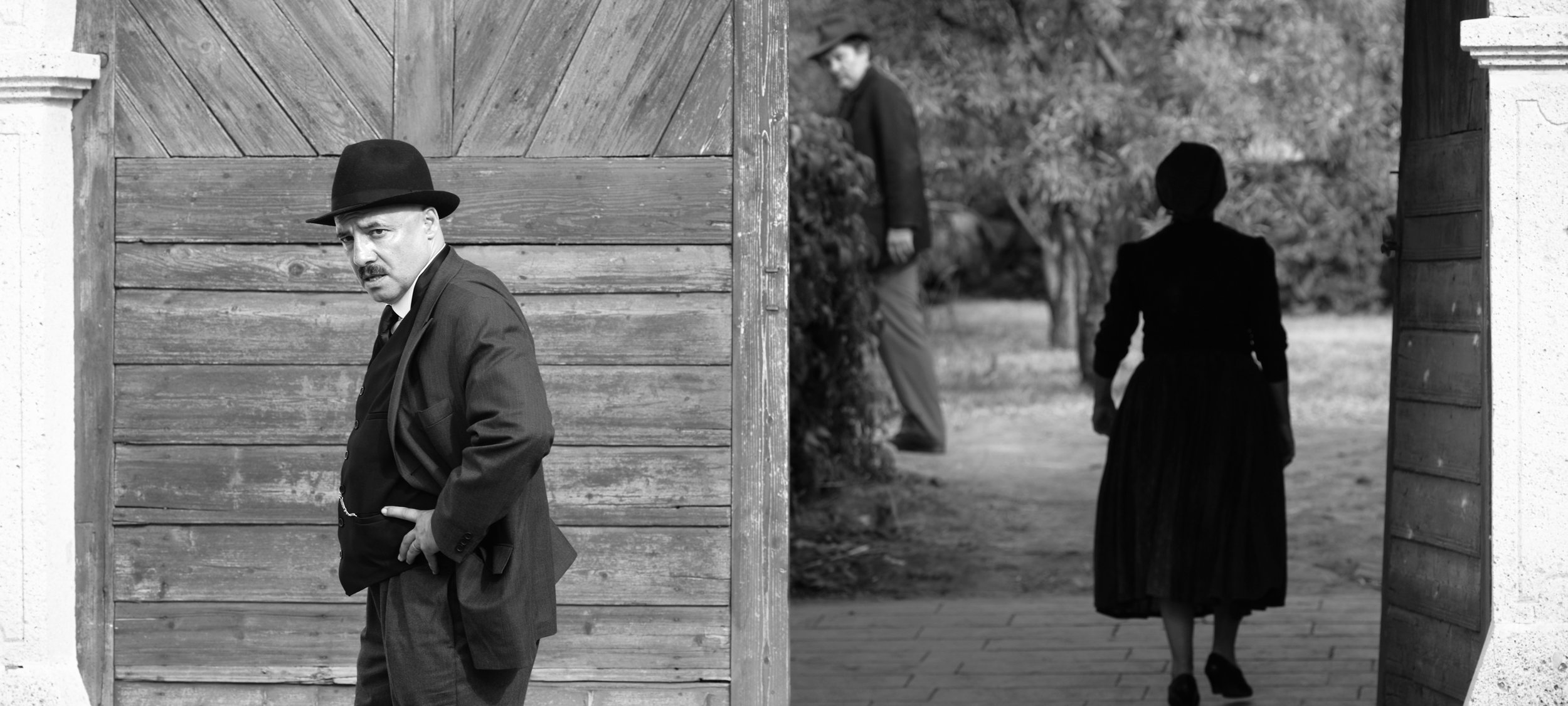MOVIE REVIEW: 1945
1945-- 3 STARS
The end of a large war is always a turning point that trickles down from the front lines and the soldiers at arms to the home front with those that maintained their respective communities when their fighters were away. Wars benefit some community members while tragically redefining others. 1945 is a small and intense microcosm of that dichotomy demonstrated over the course of one fateful day in the aftermath of World War II. Shot in bracing black-and-white, the best feature winner of the 2017 Jerusalem Film Festival, exudes strong themes of guilt across several points of view. The foreign language feature from Menemsha Films premieres this weekend exclusively in Chicago at Landmark's Renaissance Place Cinema and The Music Box Theatre.
A little over three months after V-E Day and three days after the atomic bombing of Nagasaki, the Sunday of August 12, 1945 has dawned on a small Hungarian village. It is a wedding day between the town clerk’s nervous son Arpad (Bence Tasnádi) and his more peasant fiance Rozi (Dóra Sztarenki). The townspeople shuffle about with the preparations, all under the selfishly discerning and beleaguered eye of the groom’s father Istvan (lead performer Péter Rudolf of the Glass Tiger series). A jovial glad-hander who talks out of both sides of his mouth, Istvan flexes his local government clout and is the well-off owner of the town drugstore who gets pompous motorcycle sidecar chauffeur service anywhere he goes. Everyone bows to his sometimes condescending demands of patronage and respect.
Looming are the victorious occupying Russian soldiers still circulating through town. Their presence, embodied by the adulterous Jancsi (Tamás Szabó Kimmel) and catcalling threats, fans the flames of local conversation to consider the upcoming national vote towards post-war independence or submitting to communist control. On this day, the bothersome men in uniform are not the ones that strike the most unspoken fear into these Hungarians.
Two Jewish men dressed in black have arrived by train and rented a horse-and-wagon service to deliver special cargo into town. Due to the insidious agenda of the war, Jews haven’t been seen in town in years. As the whispers get louder and the stares get longer, especially from Istvan, we get the distinct impression that this religious demographic is looked upon with disdain. Nevertheless, with the invisible ticking clock of an afternoon wedding keeping pace, the arrival of these two travelers stirs an urgency in all points of view from the wedding participants to the wagon workers.
1945 is crafted with superb foreground and background cinematography from Emmy winner Elemér Ragályi (Rasputin). His monochromatic color scheme is striking on its own and amplified when combined with the placement choices to work the camera through doorways, windows, and rotational turns. Excellent editing from veteran TV editor Béla Barsi combines all of the human perspectives into a pendulum of fluidity to follow each plot angle. The visuals are backed by a sparse musical vibe of bells and percussion bars of growing dread provided by Tibor Szemzö.
Based on the story "Homecoming" by Gábor T. Szántó, 1945 is unafraid to portray off-putting prejudice over the course of a steady and slow build by director Ferenc Török. The simmering malcontent in not obvious at first, headed by a debilitating and debasing moral decline portrayed by Rudolf and crafted by Török and his co-writer Gábor T. Szántó. It burns like the cigarillos smoked in the film and lingers like the emanated smoke. The sense of increasing dread and possible comeuppance is decidedly concentrated. When the purpose hits you of what those Jewish visitors are there for, it all changes and all crashes at the same time.
LESSON #1: SMALL TOWNS TALK-- Everyone knows everyone’s business in a small community. Assumptions are just as bad as gossips and there are few true secrets. Those that do exist are the most damaging because of the close connections of a small population the knows and depends on each other. This unassuming town is packed with unspoken potential damaging truths, particularly how Istvan came to his modest fortune and position.
LESSON #2: RETURNING WHAT IS NOT YOURS TO KEEP-- Because of power struggles for dominance and clear distinctions of financial class, what isn’t so secret in his Hungarian hamlet is who is in charge or carries the weight. That said, morality should be respected and accorded. People shouldn’t go back on deals and agreements, be them for property and keepsakes or those for marriage and love.
LESSON #3: THE POTENCY OF WARTIME GUILT-- This lesson is where all of the stresses seen in 1945 originate. For the last several years, the gains and losses from the war have infected this town from the top to bottom, from the secrets of Lesson #1 to the collection of leverage amassed in Lesson #2. All of those known and unknown mistakes came at the expense of someone else, someone they know by name. When those two Jewish strangers walk through their streets on a personal journey, the villagers see their local failings and the larger ones of resistance and inaction that led to genocide. The feelings of guilt they cannot escape are deserved and they know it.
LOGO DESIGNED BY MEENTS ILLUSTRATED (#674)



